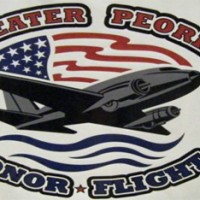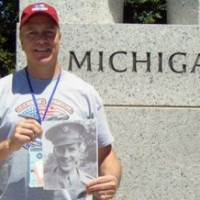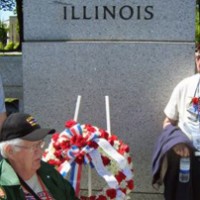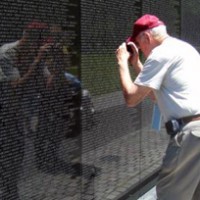Watson: Honor Flight's Memorable Trip (Part 3)
- Details
- Published on Thursday, 13 June 2013 17:16
- Written by Doc Watson
Editor's note: Doc Watson was aboard the inaugural Greater Peoria Honor Flight that took 81 veterans to Washington, D.C. on Tuesday, June 4. He wrote a series of articles about the trip, including photos, for his employer's website, www.955glo.com, and is sharing them with readers of The Peoria. This is the third and final installment.
As one of two media members on the initial trip that sent area military veterans to see their memorials, I had an ambiguous role. WEEK/WHOI-TV's Josh Simon was definitely in work mode, while I was told to "have fun," knowing that I'd talk about my experience when I returned to the 95.5 GLO airwaves the following afternoon.
I didn't want to bug the veterans too much during their once-in-a-lifetime special day. I also wanted to see the newer memorials that had been erected since my last tourist trip to D.C. during a ninth grade field trip. Plus, I wanted some alone time to think about my late father, who served some unknown role in the Army in the Pacific theater during WWII. So I went with the flow and talked a bit with whomever I bumped into or sat next to.
Walking from the Vietnam to the Korean War Memorials, I met up with the Anton group. Nick and Nell Anton of Pekin had the distinction of being the only married pair of veterans in our group. Nick was an enlisted man in the Air Force in WWII, serving as a B-29 bomber mechanic on Guam. He attended Bradley University after the war and earned an officer's commission before getting called back to duty for the Korean War. Nell served as a nurse during that war.
"We met at a bar," Nick joked. More precisely, they met at a cocktail lounge at the officer's club at Eglin Air Force base in the Florida panhandle, where both served stateside during the early 50's. Nick remembers asking Nell's friend to serve as interpreter because he was having trouble deciphering her North Carolina accent. Despite that inauspicious start, they married two years later and have been so for an amazing 60 years.
Nell, however, remembers their beginning slightly differently. "We met on a psych ward," she cracked, "and I had the key." Nick acknowledged that version as "somewhat true." Nell was the nurse in charge of security at the closed ward, where each soldier/patient had his own locked room. Nick was a staff psychologist on the board that administered psychological testing to airmen and officers. After the war, Nick took that experience to Caterpillar, starting out doing similar work there before finishing his 30 year career by training managers.
Nick, like many of the vets I chatted up on this day, downplayed his role in the military. "I'm really happy for these guys, especially the Vietnam guys, who trudged through the jungles and came home to a poor reception. All I did was fix planes." He mentioned how some of the guys he'd shared a beer with at the Reagan Airport had been through tougher experiences than he did. One of the guys he spoke about served a role that few survived. Ironically, I'd overheard a conversation at the Vietnam Wall between that man and a Washington area veteran earlier.
The Washington vet approached our local central Illinois vet, and they hit it off quickly, talking, smiling and shaking hands. When our vet mentioned what unit he was in during WWII, the other vet replied, "You shouldn't be alive!" The Illinois man was Flanagan, Illinois' Delbert Augsburger, a ball turret gunner over the skies of Europe.
Of the roughly 16 million U.S. military members who served in WWII, only about 30,000 were chosen to be belly gunners. Most did not survive. Delbert's 91st Bomb Group in the 8th Air Force suffered the greatest losses of any heavy bomb group in WW II. These gunners sat in a cramped "ball" underneath B-17 bombers, firing .50-caliber Browning machine guns at German aircraft that intercepted our planes. WWII was the only war that featured this isolated, vulnerable, exposed gunner position.
To hear Delbert tell it, however, he grew accustomed to the harrowing air battles. In all, he flew on 23 combat missions. He admitted feeling frightened just before entering the battle, when he could see the anti-aircraft flak shells exploding in the sky just ahead. He said when he quit flying, he was "disappointed, really, because we got extra money in our paychecks for combat pay."
The belly gunner role was not one that men chose generally. Delbert wanted to be an Air Force pilot when he joined up as a teenager. He tested and was close. Then, he was sent to gunnery school in Las Vegas. After the war, he used the G.I. Bill to obtain his private pilot's license and did "buzz my dad on his tractor on the farm a few times."
I mentioned in an earlier blog that the fate of our military men in war was so random. Delbert survived 23 missions in a short-life-expectancy gunner slot. His son, Dave, also feels lucky to have survived, but he did not come out unscathed.
Dave served in the Army during the Vietnam War. In 1969, his troop transport truck ran off the road and struck a pole that crashed down on to the vehicle, carrying 9 soldiers. The driver, it was later discovered during a military trial, had suffered a seizure due to undiagnosed epilepsy. The pole severed off Dave's right arm, which had been hanging out over a railing, and came within inches of killing him. One fellow passenger died when that pole struck his head. Wondering why the truck was heading off the road, Dave had leaned forward to investigate seconds before the impact, saving his life.
Dave remembers his flight back to the U.S. was not warmly received, unlike the just completed inaugural Peoria Honor Flight. After landing in Washington, D.C., they off loaded the wounded soldiers before reaching the terminal to avoid sign-carrying protestors at the gate and along the airport fence lines. He was transported on a bus with no military markings or windows, attempting to be inconspicuous and not incite the anti-war crowd. During his rehab at the Walter Reed Army Medical Center, he and his fellow vets stayed away from the college kids' hangouts and spent time socializing at veteran's organizations for the same reason.
"Back home it was better." Dave said, "I was always treated well, treated as a soldier. Of course, Flanagan is small and I'm related to half the town." He also didn't encounter animosity in Peoria, where he used the G.I. Bill to attend a computer trade school downtown. In those classes, Vietnam veterans mixed in well with recent high school graduates. Dave finished his working civilian career in 2004, after a run of over 26 years at Caterpillar.
As Nick Anton noted above, the warm return reception before thousands at the General Wayne A. Downing Peoria International Airport last Tuesday night felt tremendous to every veteran on the flight, but perhaps more so for the Vietnam veterans who never experienced a proper welcome home.
The second flight is tentatively planned for September, and donations are needed to reach the roughly $80,000 cost of each trip. If you want more info on how to get your vet on a future flight, click on http://greaterpeoriahonorflight.org
Here's the link to Part 1: http://www.955glo.com/common/page.php?pt=Greater+Peoria+Honor+Flight+Returns+After+Memorable+Trip.+%28Part+1+in+series%29&id=6293&is_corp=0
Part 2: http://www.955glo.com/common/page.php?pt=Stories+From+The+Greater+Peoria+Honor+Flight+Vets.+%28Part+2+in+a+series%29&id=6333&is_corp=0






















































